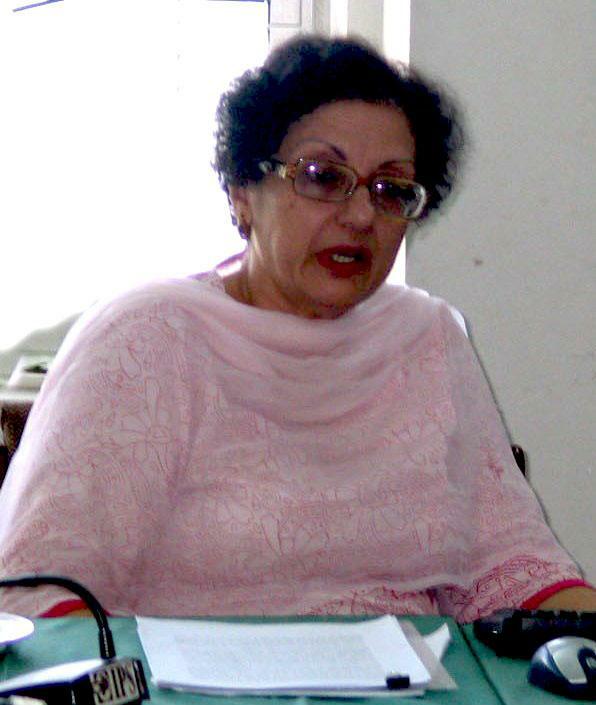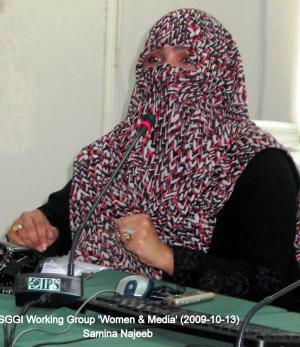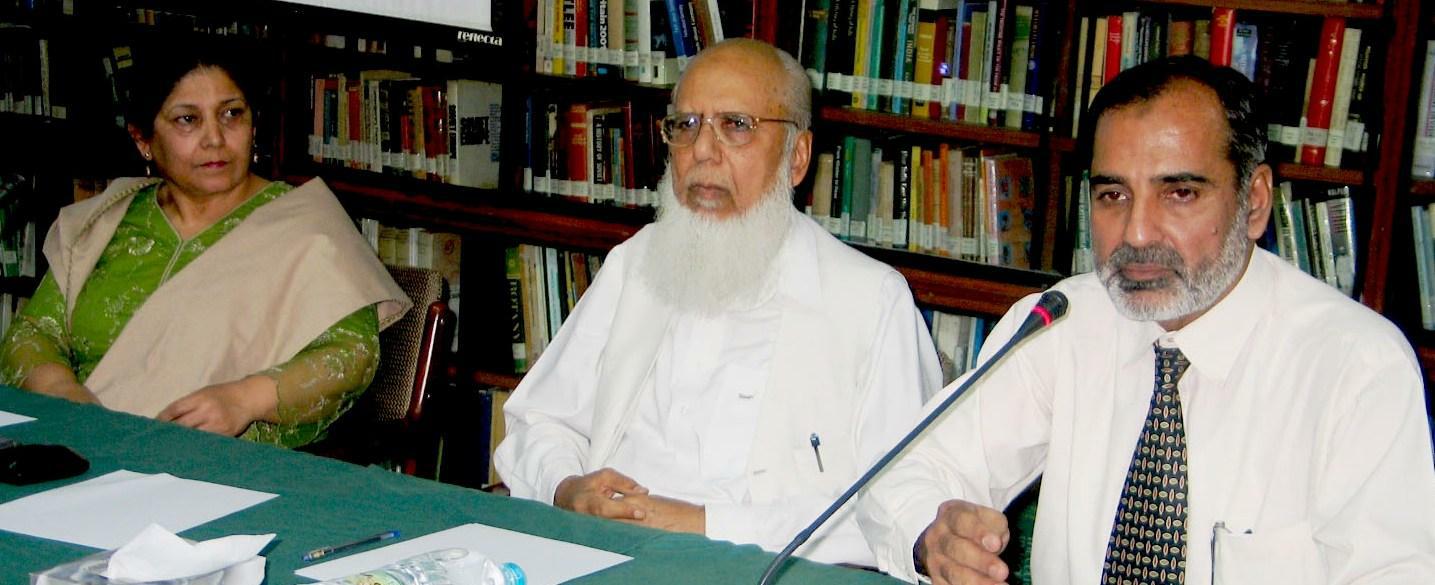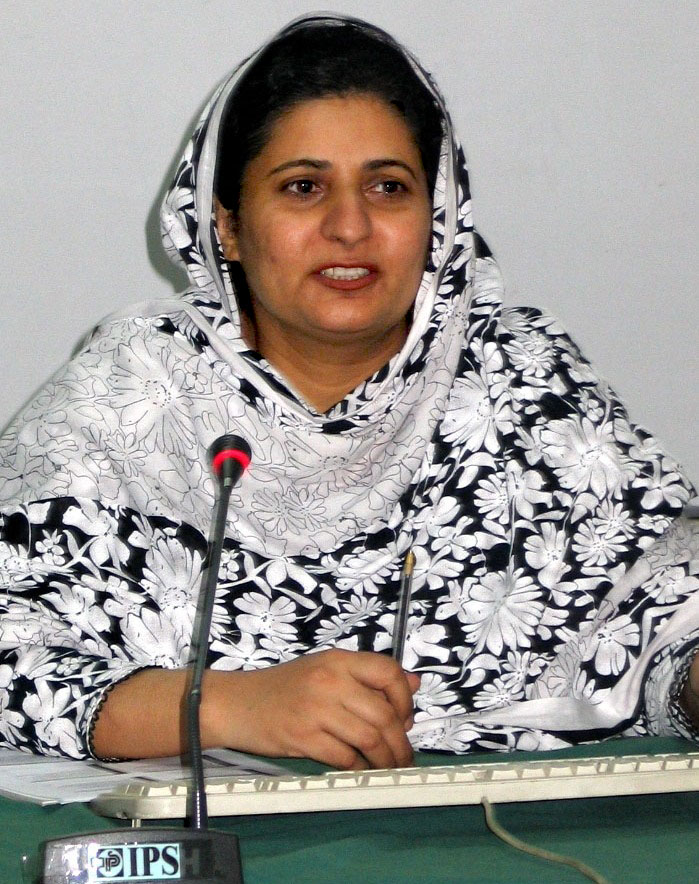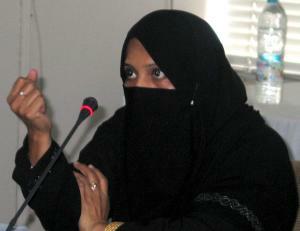A meeting of Study Group on Gender Issues (SGGI) was held with Dr. Masrur Alam Khan, Chairman Riphah Institute of Media Sciences, in the Chair.
A meeting of Study Group on Gender Issues (
SGGI ) was held with Dr. Masrur Alam Khan, Chairman Riphah Institute of Media Sciences, in the Chair.
Introducing the program,
Khalid Rahman , Director General IPS, said that the competition and struggle between nations and ideologies had been restyled in the contemporary world; presently, media was being used for generating, propagating and instilling the ideas into the minds of people, in different ways. Owing to the widespread approach and exceptional power to persuade and convince, media is increasingly being used as a tool to launch the psychological operations, in order to achieve certain short-term and long-term objectives.

Ms. Shazia Haris, a Psychologist, who carries a long experience in media management and analysis, and is currently associated with Earthquake Reconstruction and Rehabilitation Authority (ERRA) as Advisor Knowledge Management Cell, made her presentation on ‘Women and Media: Understanding Psychological Operations’.
In the presentation and the discussion, following salient points were raised.
It was highlighted that the global reach of media was one of the manifestations of globalization, and it was influencing the lives of individuals as well as of societies. Those, who manage the media, play with the psychology of the people, and make their minds through audio and visual effects, and other tools of persuasion.
Through this globalization, media (especially, the virtual media) has created a sort of generation gap, and we, as a nation, are still unable to cope this. The younger generation is seen frequently using slangs and informal language, like chat and sms language, smileys, etc, which the elder generation is entirely unaware of. So, a general atmosphere of miscommunication has been created between them.
The extraordinary influence that media can cast on public and private spheres of life makes it a useful tool to play with the psychology of a nation, and make people comprehend the things in a particular way.
Women, staying most of the times at homes, seem to be more vulnerable to the stimulus, relayed through media, than men.
The greatest challenge before us, now, is to cultivate harmony among our population in terms of national identity, collective goals and strategy, so that the present situation, leading to confusion and chaos, and making people susceptible to whatever is being told, can be avoided. Media can play a vital role in this regard to fill in such gaps, and define whatever remains vague.
In fact, when a nation or an individual does not proactively and effectively introduce itself, then media assumes the dominating role in painting its image. It is for this reason that media has been able to portray Pakistani nation as antagonistic, unfriendly and rogue, and most of the time, introduces Pakistan, in the world, as a terrorist state by drawing attention of people to the selective dimensions of various events, taking place in Pakistan, while overlooking the other.
The primary function of media is the perception management, rather than psychological manipulation. It plays with the people’s perception. Media links up the scattered information on a subject, and tries to paint such a picture as it wants its audience to see. It exploits the perceptions of the people, to guide their thought stream into a particular direction. In order to do this, media managers may deliberately ignore an incident, and disproportionately highlight another. They also take care of timing, style, and scope of their production, to make its impact stronger, while avoiding the public anger.
The concept of the ‘globalization and free market’ has immensely affected the under-developed and the developing countries, economically. Media has so successfully shown the potential to create social, political and economic instability in a country that a whole concept of Fourth Generation Warfare is developed, in which media manipulation and psychological operations are used as one of the major tools.

To shake its foundations, media targets the pillars of a society on which it stands, and the personalities whom it idealizes. It brings under discussion, all those beliefs and principles, which enjoy a status of credence in society, and thus, binds it together. Directly or indirectly, maligning Islam, and attempts to weaken the fabric of family in the Muslim societies, including Pakistan, should be seen in the same context.
Portrayal of women in the media is, in fact, a reflection of how men want her to see. Most of the media organizations are owned and run by males, and there are very few females in position of decision-making. It was, however, observed that even when women occupied executive posts, they found it difficult to think and work differently, and felt it convenient to follow the stereotypical trends.
Media is promoting the concept of individualism; it is instigating in people, an urge for autonomy and freedom from economic responsibilities and pressures. This approach, consequently, makes it difficult for men and women to carry on with their responsibilities towards their families, and so, they take it as a burden.
Once the family institution is disturbed, the society is bound to face certain social and moral predicament. This phenomenon may very clearly be seen in the industrialized nations. Realizing such problems, a number of organizations have been set up in those societies, with the sole aim to build and restore the family institution.
Apart from Japan, Australia, US, and various other developed countries, the divorce and separation rate in Pakistan has also shown an upward surge during recent years. It seems that females are being targeted to bring about a soft revolution through psychological operation in the country.

It is generally believed that our national media is not committed to the nation and its collective objectives; rather it may easily be pursued or manipulated by different stake holders to promote their agenda, while compromising, sometimes, even on national interests. Many a times, it does not refuse any lucrative offer, and allows anyone to buy its time, or manipulate its medium. Non-qualified and untrained media staff is more likely to fall prey to the PsyOps, and toe the same line that is detrimental to the social setup, national integrity, and even sovereignty.
Hence, awareness is the best shield against any such manipulation. We need to make our people aware of the media warfare, and enlighten our males and females, so that they can understand such psychological operations and techniques, being employed, and stand up to them. For this, we need to lay the strong ideological foundations in our youth, through education.
A specialized subject about psychological warfare should be introduced at university level. Persons and institutions, with national agenda, need to come forward, and establish a network, to challenge the current themes and practices, and promote indigenous values and common national objectives.

Even individuals can play a vital role to check the trends, thoughts and ideas that are being transplanted into our society, through media. People must be encouraged to raise their voice, and share their sentiments about what disturbs them in media publications and broadcast. Every sane person needs to play his/her role in whatever sphere he/she could. These individual efforts would definitely complement each other, and will eventually form a strong alliance.
War of ideas, thoughts and designs has to be fought through profound thinking and research. We need to convince the minds through arguments, and counter the propaganda with evidence.
We need to understand the characteristics of our society, its needs, and goals, very objectively, and then devise our own national strategies in keeping with the domestically available resources. Educational institutions, and especially the universities, should take lead in initiating intellectual movement of promoting maturity through pragmatic thinking.
Tuesday, July 7, 2009
 Ms. Shazia Haris, a Psychologist, who carries a long experience in media management and analysis, and is currently associated with Earthquake Reconstruction and Rehabilitation Authority (ERRA) as Advisor Knowledge Management Cell, made her presentation on ‘Women and Media: Understanding Psychological Operations’.
Ms. Shazia Haris, a Psychologist, who carries a long experience in media management and analysis, and is currently associated with Earthquake Reconstruction and Rehabilitation Authority (ERRA) as Advisor Knowledge Management Cell, made her presentation on ‘Women and Media: Understanding Psychological Operations’. To shake its foundations, media targets the pillars of a society on which it stands, and the personalities whom it idealizes. It brings under discussion, all those beliefs and principles, which enjoy a status of credence in society, and thus, binds it together. Directly or indirectly, maligning Islam, and attempts to weaken the fabric of family in the Muslim societies, including Pakistan, should be seen in the same context.
To shake its foundations, media targets the pillars of a society on which it stands, and the personalities whom it idealizes. It brings under discussion, all those beliefs and principles, which enjoy a status of credence in society, and thus, binds it together. Directly or indirectly, maligning Islam, and attempts to weaken the fabric of family in the Muslim societies, including Pakistan, should be seen in the same context. It is generally believed that our national media is not committed to the nation and its collective objectives; rather it may easily be pursued or manipulated by different stake holders to promote their agenda, while compromising, sometimes, even on national interests. Many a times, it does not refuse any lucrative offer, and allows anyone to buy its time, or manipulate its medium. Non-qualified and untrained media staff is more likely to fall prey to the PsyOps, and toe the same line that is detrimental to the social setup, national integrity, and even sovereignty.
It is generally believed that our national media is not committed to the nation and its collective objectives; rather it may easily be pursued or manipulated by different stake holders to promote their agenda, while compromising, sometimes, even on national interests. Many a times, it does not refuse any lucrative offer, and allows anyone to buy its time, or manipulate its medium. Non-qualified and untrained media staff is more likely to fall prey to the PsyOps, and toe the same line that is detrimental to the social setup, national integrity, and even sovereignty. Even individuals can play a vital role to check the trends, thoughts and ideas that are being transplanted into our society, through media. People must be encouraged to raise their voice, and share their sentiments about what disturbs them in media publications and broadcast. Every sane person needs to play his/her role in whatever sphere he/she could. These individual efforts would definitely complement each other, and will eventually form a strong alliance.
Even individuals can play a vital role to check the trends, thoughts and ideas that are being transplanted into our society, through media. People must be encouraged to raise their voice, and share their sentiments about what disturbs them in media publications and broadcast. Every sane person needs to play his/her role in whatever sphere he/she could. These individual efforts would definitely complement each other, and will eventually form a strong alliance.




